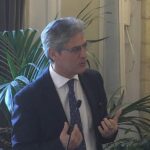Interview | Charlie Beckett
Polis / London School of Economics
by Luciana Gurgel, from London
Charlie Beckett is a journalist with 20 years of experience at the BBC and ITN’s Channel 4 News. He started his career on local newspapers in his native South London. In 2006 he founded Polis, the Journalist think tank at the Media and Communications Department of the London School of Economics.
The institution became an important a forum for public debate on key issues of journalism.He has an interesting view on the recent changes on the industry:
“The whole information ecosystem has changed and so has society. In terms of technology and news, there have been three big shifts. First, there was the move online more than 20 years ago. News organisations got websites. Secondly, there was the move into social media. This was much more complicated in the ramifications and in terms of the kind of journalism that was produced and the relationship with the audience. Thirdly, we are now in a phase where journalism is going to become much more distributed, much more diverse in terms of the organisations, and much more devolved in terms of how people get their information. AI and ML technology is going to be at the heart of this.”
In an article published in March 26 on Medium, Professor Beckett highlighted the pressures suffered by media professionals then:
“Journalists were under enormous pressure right now. There is a huge public appetite for information and debate and the means to feed it are tougher than ever. The coronavirus story is unprecedented.
In his view, in 2020 things just got a lot more complex and uncertain for the media:
“All this happens when the news media is going through an economic crisis, a business model and production revolution and facing greater competition than ever. Add in the structural changes in audience behaviour, the new information ecology of the tech platforms and the growth of mis and disinformation online. Now throw into that broiling mixture a story like coronavirus. It is historically exceptional.
And raised an important question:
It is still early days but what can we learn about the challenge to journalism it presents?
Six months after the pandemic was declared by the World Health Organization, there are still many questions unanswered. Professor Beckett shared with MediaTalks some thoughts on the present and the future
You have described three big shifts in technology and news. However, the news industry in less developed countries have not yet evolved to the second shift. Is there’s a risk of a quality gap in journalism between countries in a near future, with effects on the society and democracy?
There is a clear risk that the inequalities between news organisations will be furthered by new technologies. That is why it is so important that there is more collaboration between news organisations and with other bodies such as universities, NGOs, start-ups and tech companies. Our Journalism AI project at LSE is working to share best practice, training and knowledge between all news organisations to help bridge the gap. It is in the interest of every news organisation to help support the sector as a whole. Industry associations need to work much harder of providing mutual assistance and there is even a role for government in providing better media education and infrastructural support.
How technologies like Artificial Intelligence and Machine Learning will affect the work of journalists in the newsrooms?
We have too many journalists and too few. By that I mean we have too many journalists who are just duplicating other people’s work. And too many creating routine or mediocre content that could probably be created more efficiently by ‘machines’. The new generation of journalists will have to be much more flexible, multi-skilled and adaptable. They will also have to work even harder at adding value. We have too many journalists doing traditional, mainstream news and not enough filling the gaps – at local level, new subject beats, neglected audiences.
Trust in social media has declined during the pandemic according to several researches compared with the news media. Is it a trend, or just a temporary effect? Could this trend impact initiatives of media organisations towards using social media to engage audience?
I think the whole trust debate is a distraction. Trust is not a given and you can’t just buy it or built it overnight. It is a relationship of reliability, transparency, humility and public service. You earn trust by behaving well over time. News organisations and individual journalists need to think of their work as a relationship with the audience that delivers value not just content. Being more emotionally literate is part of that process. That might mean using humour or new formats, but above all it means acting in a responsible and responsive way
You have written about the need of support to protect journalism values and to innovate. From where could we expect funding will come from, in particular after the Covid-19 crisis?
Future funding models depend a lot on local or national circumstances. The UK has long benefitted from a healthy mix of public sector and privately-owned news organisations. The Guardian with its trust-owned model is an interesting variant. But whatever the funding model, news organisations need to be competitive and seek attention. I am a strong believer in the value of commercial funding that can support independent, innovative and enterprising news media. However, clearly that business model will be limited to a few core enterprises that can achieve scale or specialise and attract the limit amount of subscription revenue. Philanthropy will be a key element. Charities and foundations need to realise that a healthy news media is a vital part of society and can support other philanthropic goals.
Support from global platforms has been limited to a few. What’s their role on the future of quality journalism?
The technology companies can provide more support but their best contribution might be to improve the prominence of quality journalism on their networks and to share more data with news organisations. There will be no one solution. All news organisations will have to diversify, innovate and focus much better of delivering value to audiences.
Luciana Gurgel, is a Brazilian journalist based in London. She begun her editorial career at O Globo, one of the leading Brazilian media organisations. Later she founded (along with Aldo de Luca) Publicom, a successful corporate communications agency, acquired in 2016 by Weber Shandwick (IPG Group). In London, she has been working as news correspondent for Brazilian media – MyNews Channel, J&Cia – to which she writes a weekly column on trends and issue related to the news industry. The column originated a separate platform, MediaTalks, headed by Luciana from London as Editor-in-Chief, in association with Jornalistas Editora.












